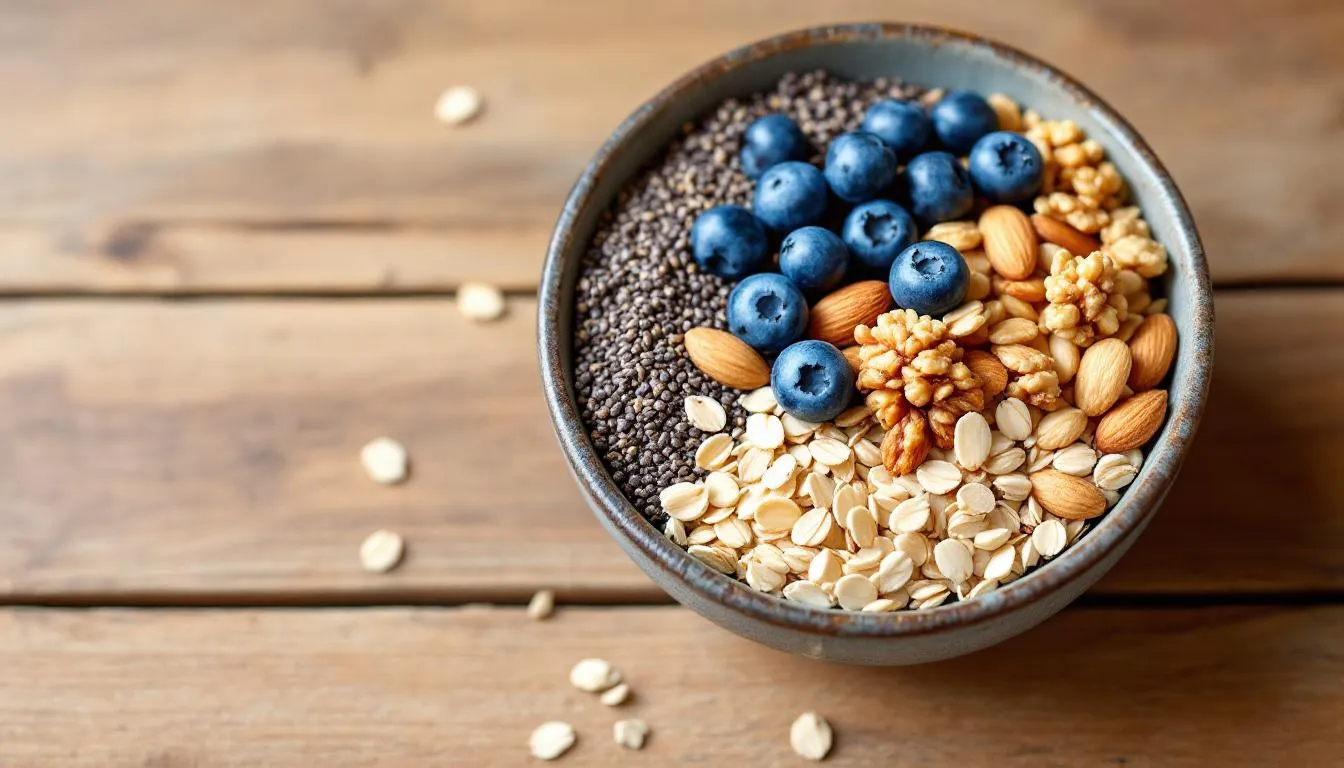Top 7 Essential Supplements to Take in Your 40s 50s
In your 40s and 50s, your body’s nutritional needs change. This article outlines the top 7 supplements to take in your 40s 50s during these years to support your health, from heart and brain to bone strength.
Key Takeaways
- Supplementation is crucial for middle-aged adults to address changing nutritional needs and maintain overall health, especially to support heart, brain, and bone health.
- Key supplements include Omega-3 fatty acids, Vitamin D, Calcium, Magnesium, Vitamin B12, and Fiber, each playing a specific role in supporting health as we age.
- Consulting a healthcare provider is essential for creating a personalized supplementation plan to address individual health needs and mitigate age-related decline.
Understanding the Importance of Supplements in Middle Age

Entering middle age signifies a period of profound transformation, not just in our bodies but also in our nutritional needs. As we age, our bodies become less efficient at absorbing essential nutrients, making supplementation a crucial component of maintaining overall health. While younger adults can often rely solely on diet to meet their nutritional requirements at a younger age, middle-aged and older adults may need additional support to ensure adequate intake of vital nutrients, especially in older age. The challenges faced by the aging population highlight the importance of addressing these nutritional needs for older people.
The changes in body composition during this later life stage, such as loss of muscle mass and bone density, require a focus on specific nutrients to support metabolic health and maintain physical and cognitive functions, including brain function and blood flow. National institutes recommend regular supplementation to significantly enhance the quality of life by supporting physical health and mental decline, ultimately helping us to stay physically active and engaged in our social life and interests, promoting age related decline healthy aging. Even an old dog new tricks can adapt to these changes, which may help mitigate memory loss.
Consulting a healthcare provider to create a personalized supplementation plan is advisable.
Omega-3 Fatty Acids for Heart and Brain Health

Omega-3 fatty acids are a powerhouse when it comes to promoting heart and brain health. These essential nutrients play a critical role in reducing triglycerides, lowering the risk of heart arrhythmias, and improving cognitive test performance. Research shows that Omega-3s also help regulate inflammatory cytokines, which are crucial for managing inflammation and supporting overall health. As we age, the importance of maintaining heart health and cognitive abilities becomes even more pronounced, making Omega-3s a valuable addition to our daily regimen to help combat heart disease.
Our bodies cannot produce Omega-3s, so they must be obtained through diet or supplements. Omega-3s are vital for emotional health and managing conditions like Alzheimer’s disease, making them indispensable for maintaining health and vibrancy in later years.
Best Sources of Omega-3s
The best sources of Omega-3 fatty acids are found in:
- Fatty fish and fish oil supplements
- Fatty fish such as salmon, mackerel, and sardines
- Other dietary sources including liver, beef, and fortified foods These can all contribute to your Omega-3 intake.
Incorporating these animal foods and whole grains into your diet can help ensure you receive the benefits of Omega-3s.
How Much Omega-3s Do You Need?
Determining the right dosage of omega-3s is crucial for maximizing their benefits, especially at higher doses. Consulting a healthcare provider can help tailor the dosage to your individual health needs, ensuring you receive an adequate intake.
When choosing Omega-3 supplements, opt for high-quality, purified fish oil products that have been third-party tested for safety and efficacy. This ensures you are getting the most out of your supplements and supporting both your heart and brain health effectively.
Vitamin D for Bone and Immune Health

Vitamin D is essential for maintaining bone health and supporting the immune system. It plays a critical role in regulating calcium and phosphate levels, which are necessary for bone strength and muscle function. As we age, our bodies become less efficient at converting sunlight into Vitamin D, leading to potential deficiencies. This is particularly concerning for older adults, as Vitamin D deficiency is linked to age-related muscle weakness, loss of muscle mass, and an increased risk of falls and fractures.
Declining estrogen levels in women can diminish the effectiveness of Vitamin D. Therefore, ensuring adequate intake of Vitamin D becomes even more important. Supplementation with Vitamin D3 not only supports bone and muscle health but also aids in modulating immune response, contributing to overall health and well-being.
Ensuring sufficient Vitamin D levels is crucial for maintaining bone density and preventing chronic inflammation, which can impact general health and longevity.
Sources of Vitamin D
Natural food sources of Vitamin D include fatty fish, egg yolks, and fortified foods such as milk and cereals. For optimal absorption, take Vitamin D3 supplements with fat, like an omega-3 supplement.
The best form of Vitamin D for absorption is Vitamin D3 (cholecalciferol), which is highly effective in maintaining adequate Vitamin D levels in the body.
Recommended Dosage
For women under 70, the recommended daily intake of Vitamin D is 15 mcg, while for adults over 70, it increases to 20 mcg. Proper supplementation doses are crucial for maintaining health, especially as nutritional needs change with age.
Receiving the right amount of Vitamin D supports bone density, muscle function, and immune health, making it a crucial part of your daily routine.
Calcium for Strong Bones
Calcium plays a vital role in maintaining bone structure and strength, especially in older individuals. As we age, our bones naturally lose density, making adequate calcium intake crucial for preventing age-related bone loss. Adequate calcium levels mitigate bone density loss and maintain overall bone health. This mineral is essential not only for bone health but also for proper bodily functions, including muscle contractions and nerve signaling.
Older adults need to pay particular attention to their calcium intake to support their skeletal health and prevent conditions such as osteoporosis. Regular physical activity, including strength training, can further enhance the benefits of calcium by promoting bone density and overall strength.
Dietary Sources of Calcium
Good dietary sources of calcium include milk, yogurt, and cheese, which are rich in this essential mineral. Additionally, green leafy vegetables and fortified foods such as plant-based milk and cereals can significantly contribute to your daily calcium intake.
A diet rich in these foods maintains bone density and overall bone health.
Supplementing with Calcium
When dietary intake alone is insufficient, calcium supplements can help bridge the gap. Women in their 40s are recommended to consume 1,000 mg of calcium daily. This amount helps to meet their nutritional needs. Calcium carbonate and calcium citrate are the two most common forms of calcium supplements, with calcium citrate being effective when taken with or without food, making it suitable for those with low stomach acid.
Adequate calcium intake, through diet or supplements, is key for maintaining bone health and preventing age-related bone loss.
Magnesium for Muscle and Nerve Function

Magnesium is a crucial mineral that supports over 300 enzyme reactions in the body, including those necessary for muscle contraction and nerve transmission. It plays a significant role in protein and bone production, maintains stable blood sugar levels, and supports overall nerve health. As we age, magnesium deficiency becomes more common, making it essential to ensure adequate intake for optimal muscle and nerve function. Regular intake of magnesium can help maintain muscle mass, function, and repair, contributing to overall physical well-being.
Sufficient magnesium levels support cognitive function, muscle strength, and overall metabolic health in older adults. Incorporating magnesium-rich foods into your diet and considering supplementation can help address the common deficiency seen in this age group.
Best Foods for Magnesium
Foods that are particularly high in magnesium content include:
- Whole grains
- Legumes
- Green leafy vegetables
- Pumpkin seeds
- Nuts
- Seeds These foods are excellent dietary sources and can significantly contribute to your daily magnesium intake.
Including these foods in your diet can help support muscle and nerve health effectively.
Supplementation Tips
When it comes to magnesium supplements, choosing the right form is crucial for effectiveness. Magnesium citrate and magnesium chloride are more easily absorbed compared to magnesium oxide, making them preferable options.
Consulting with a healthcare provider can help determine the best form and dosage to support your muscle function, nerve health, and overall metabolic health.
Vitamin B12 for Blood and Nerve Cells
Vitamin B12 is essential for maintaining healthy blood and nerve cells, which are critical for overall cognitive and nerve health. Adequate Vitamin B12 levels are particularly important as we age, as deficiency can lead to cognitive decline and other health issues. Aging increases the risk of Vitamin B12 deficiency due to reduced absorption capabilities, making supplementation necessary for many older adults. Adequate Vitamin B12 intake maintains brain health and prevents cognitive decline.
Vitamin B12 deficiency is common among older adults, often due to factors such as atrophic gastritis and certain medications that affect absorption. Addressing this deficiency through diet and supplements is crucial for maintaining overall health and well-being.
Sources of Vitamin B12
Animal foods that are key sources of Vitamin B12 include:
- Meat
- Fish
- Eggs
- Dairy
Including these foods in your diet can help ensure adequate Vitamin B12 levels, which are essential for producing healthy blood and nerve cells.
Addressing Deficiency
To address Vitamin B12 deficiency, it is important to ensure an adequate intake through diet and supplements. The recommended daily intake of Vitamin B12 for women is 2.4 mcg.
Consulting a healthcare provider can help determine the best approach to managing deficiency and maintaining optimal health.
Fiber for Digestive and Heart Health

Fiber plays a critical role in supporting digestive and heart health. It aids digestion, maintains healthy blood glucose levels, and lowers LDL cholesterol, which is essential for preventing strokes and other cardiovascular issues. Adequate fiber intake supports metabolic health and overall well-being. Adults need about 25 grams of fiber daily, which can be achieved through a diet rich in whole grains, fruits, vegetables, and legumes. Boosting fiber intake by just 5 grams can reduce the risk of depression by 5 percent, highlighting its importance for mental and emotional health.
When dietary changes alone do not provide sufficient fiber, supplements may be recommended. Fiber supplements can help those with certain digestive conditions or who struggle to meet their fiber needs through food. Adequate fiber intake is crucial for overall health and preventing various conditions.
High-Fiber Foods
High-fiber foods include whole grains, fruits, vegetables, and legumes, which are vital for overall health. Beans and legumes are among the richest sources of dietary fiber and can significantly improve digestive health. Including these foods in your diet can help maintain high blood pressure, support gut health, and promote general well-being.
When to Use Fiber Supplements
Fiber supplements can be beneficial when dietary intake is insufficient. It is advisable to introduce fiber supplements gradually to minimize gastrointestinal discomfort. Additionally, staying hydrated is crucial when taking fiber supplements to prevent digestive issues.
Consulting a healthcare provider can help determine the best approach to incorporating fiber supplements into your routine.
Ashwagandha for Stress Relief
In the hustle and bustle of middle age, managing stress becomes a crucial aspect of maintaining mental well-being. Ashwagandha, an adaptogenic herb, is recognized for its ability to help manage stress and improve mental well-being. It works by lowering cortisol levels, a hormone that plays a critical role in the body’s stress response and maintaining homeostasis. Incorporating Ashwagandha into your daily routine can significantly alleviate stress, especially during significant hormonal changes in midlife.
Moreover, Ashwagandha enhances the body’s ability to manage stress, contributing to better emotional health and overall mental well-being. This makes it an excellent supplement for those looking to relieve stress and maintain a balanced, healthy lifestyle.
Benefits of Ashwagandha
Ashwagandha, classified as an adaptogen, helps the body manage stress more effectively. For stress relief, a daily intake of 250–500 mg of Ashwagandha is generally recommended for at least one month.
This herb can significantly enhance your emotional health and mental health, making it easier to navigate the challenges of middle age with a calm and focused mind.
How to Take Ashwagandha
Ashwagandha is available in various forms, including capsules, powders, and tinctures, allowing you to choose the option that best fits your lifestyle. Selecting the right form can enhance its effectiveness based on individual preferences and needs.
Integrating Ashwagandha into your routine can be a simple yet powerful way to improve your mental well-being and manage stress effectively.
Summary
In conclusion, maintaining health and vitality in your 40s and 50s is achievable with the right supplements. Omega-3 fatty acids, Vitamin D, Calcium, Magnesium, Vitamin B12, Fiber, and Ashwagandha each play a unique role in supporting various aspects of health. Ensuring adequate intake of these supplements can enhance your physical and cognitive functions, support bone and muscle health, improve heart and digestive health, and help manage stress. Embrace this phase of life with confidence, knowing that these supplements can significantly contribute to your overall well-being.
Frequently Asked Questions
Why are supplements important for middle-aged adults?** **?
Supplements are essential for middle-aged adults as nutrient absorption declines with age, which can lead to deficiencies. They play a vital role in supporting metabolic health, bone density, and cognitive functions.
What are the best sources of Omega-3 fatty acids?** **?
The best sources of Omega-3 fatty acids are fatty fish like salmon, mackerel, and sardines, along with liver, beef, and fortified foods. Incorporating these into your diet can significantly enhance your Omega-3 intake.
How much Vitamin D should I take daily?** **?
You should take 15 mcg of Vitamin D daily if you are under 70 years old, while those over 70 should aim for 20 mcg. This ensures you meet your nutritional needs effectively.
What foods are rich in Magnesium?** **?
Foods rich in magnesium include whole grains, legumes, green leafy vegetables, pumpkin seeds, nuts, and seeds. Incorporating these into your diet can significantly enhance your magnesium intake.
How does Ashwagandha help with stress?** **?
Ashwagandha effectively reduces stress by lowering cortisol levels, which enhances the body's ability to manage stress and improve overall mental well-being.

